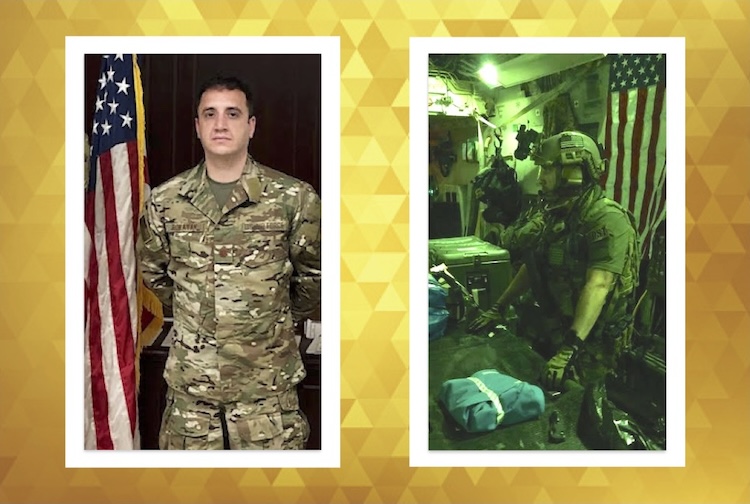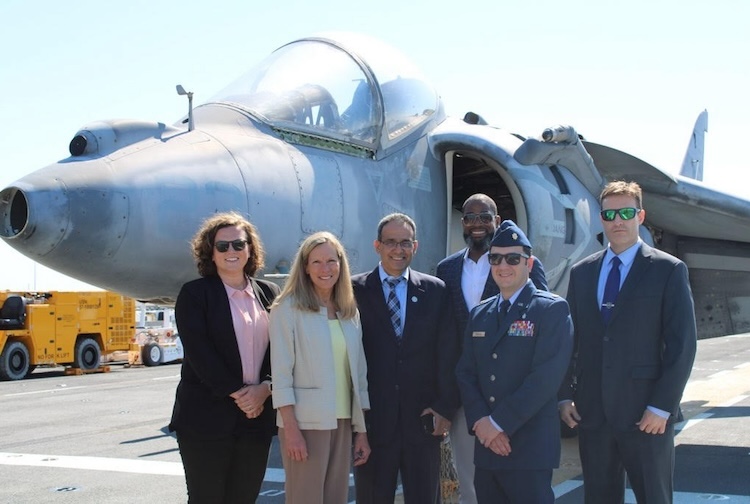A Citizen Airman's unbreakable resolve to serve the nation by caring for patients both stateside and abroad
Inspired at a young age, Omar Rokayak is now leading the charge of Military-Civilian Partnerships at VCU Health.
November 11, 2024 (Right) Omar Rokayak, D.O., medical director of Military-Civilian Partnerships at VCU Health, was involved in several combat deployments including the Afghanistan withdrawal of 2021. (Contributed photo)
(Right) Omar Rokayak, D.O., medical director of Military-Civilian Partnerships at VCU Health, was involved in several combat deployments including the Afghanistan withdrawal of 2021. (Contributed photo)
By Joan Tupponce
As the medical director of Military-Civilian Partnerships (MCP) at VCU Health, Omar Rokayak, D.O., has found the perfect intersection of two passions — medicine and the military.
A native of Charlotte, N.C., Rokayak initially thought he wanted to pursue law, politics, or diplomacy. But he was redirected to a new path during high school and a brief time in the U.S. Air Force Reserve Officers' Training Corps (ROTC) program.
Rokayak traces his love of medicine back to his mother, who he cared for at the age of 14 when she was in the throes of a third bout with breast cancer. Before his mother's passing less than two years later, the level of dedication, compassion, and service provided by her oncologists and surgeons was very evident to him.
“They inspired me greatly,” he said. “I wanted to join the ranks and have as close of a positive impact on my patients and their families as they did on my mother and I.”
Both of these passions featured service to others and that's an ideal Rokayak strives to live by every day. When he was in college, he became heavily involved in community outreach, research, and student government. He was equally dedicated to his studies and his future.
“I worked 25 hours a week and invested my money into a side business to put myself through school,” he said. “All of those experiences ultimately allowed me to learn and grow significantly as I focused on getting myself to where I needed to be as a hopeful competitive medical school applicant.”
Rokayak didn't choose his specific path in the medical field until the fourth year of his general surgery residency at Stony Brook-Southampton Hospital in New York.
“I ultimately decided on trauma surgery and surgical critical care. It fell in line with my goal of a future military career. There was a critical shortage in the military,” he said.
We aim to provide the military with an ideal environment where they can benefit from various impactful immersion patient care experiences within our academic Level I trauma center, ultimately enhancing their readiness to deploy and provide the highest level of care possible to our wounded service members.
Omar Rokayak, D.O., medical director of Military-Civilian Partnerships at VCU Health and Major in the U.S. Air Force Reserves
He first learned about the Special Operations community after talking with a friend who was a prior U. S. Army Green Beret.
“He was instrumental in shaping my path forward. He was always humble, dedicated, motivated, hardworking and genuinely a great human being. Getting to know him better, his extraordinary service to our country in some of the most dangerous and challenging environments, and his resolute character despite all that he had seen and been through inspired me further,” he said.
Rokayak was in the midst of deciding what branch of the military he wanted to join when he learned of the Air Force Special Operations Command (AFSOC) formed the Special Operations Surgical Teams (SOST); a unique, highly-mobile, and tactically trained surgical team dedicated to providing advanced trauma surgery, critical care, and casualty evacuation to all Special Operations Forces regardless of branch.
“That made my decision easy,” he said. “I felt that joining SOST would allow me to provide the greatest good for the greatest number of folks.”
There was only one problem, though. He was a civilian with no prior military experience and up to that point, no civilian had gone through the Assessment and Selection process for AFSOC'S SOST.
“It was quite a long reach for me... but I was extremely fortunate to make it through phase one of Assessment and Selection and attend phase two. It was a grueling process at times but an absolutely great experience that I believe made me a better surgeon, teammate, leader, and follower when need be,” he said.

Omar Rokayak, D. O., is a trauma surgeon and Major with the U.S. Air Force Reserves. He is currently the medical director of the Military-Civilian Partnerships at VCU Health. (Sara McCloskey, Enterprise Marketing and Communications)
As the first civilian to successfully complete AFSOC SOST Assessment and Selection, he matriculated directly into SOST as a Captain.
He later attended and graduated the Air Force Officer Training School (2018), joined the division of Trauma and Acute Care Surgery at the University of Alabama at Birmingham (UAB) as a clinical assistant professor (2018), promoted to the rank of Major (2019), and completed his surgical critical care fellowship at UAB before joining VCU as an assistant professor in 2023.
He now seeks to mesh his military experiences and his experience at UAB with his position in the MCP at VCU Health.
Providing the 'greatest good for the greatest number of folks'
MCPs are a growing field. These agreements between a civilian institution and branches of the military provide an avenue for continued knowledge and skills exchange for trauma care and emergency preparedness.
“There are hundreds of these partnerships across the country. They vary in size and scope,” Rokayak said.
At its core, the concept isn't new. There have been working relationships between the military and civilian medical services for hundreds of years. But there wasn't a formal type of partnership until after the first Gulf War in 1990, which “demonstrated significant shortfalls in the state of medical readiness,” according to the American College of Surgeons “Blue Book: Military-Civilian Partnerships for Trauma Training, Sustainment and Readiness.”
“These partnerships were developed as a deliberate and comprehensive solution having also recognized that the U.S. as a whole has several opportunities for improvement in trauma care as well as disaster management and emergency preparedness.” Rokayak said.
The overarching goal of an MCP is for the nation to get as close as possible to zero preventable deaths from injury, both stateside and on the battlefield, by enhancing and implementing the highest quality trauma care practices in both military and civilian settings.
Our goal is to have as broad-based, multi-faceted, and impactful of a program as possible. Here at VCU Health, we have everything we need and more to do just that.
Omar Rokayak, D.O., medical director of Military-Civilian Partnerships at VCU Health and Major in the U.S. Air Force Reserves
Before transitioning into the reserves and coming to VCU Health in 2023, Rokayak spent five years at the University of Alabama in Birmingham in the division of Trauma and Acute Care Surgery where he was stationed as part of the MCP between UAB and AFSOC.
Two years into his time on active duty, Rokayak was appointed as the Chief Medical Officer for SOST and became even more involved in the programmatic and quality improvement efforts of both SOST and the MCP at UAB as a whole. He was deployed as a battlefield surgeon and clinical lead on various combat and humanitarian operations, leading three separate teams in support of US Special Operations Forces, including the Afghanistan withdrawal in August of 2021.
For their efforts, Rokayak and his teams were honored with numerous awards including the Joint Service Commendation Medal with combat device, the Meritorious Service Medal, and the Bronze Star Medal. He attributes his teams' success in achieving zero preventable deaths across those numerous deployments to his incredible teammates as well as the invaluable experiences and mentorship they received at UAB.
“One of the greatest positive influences on my development and growth as a surgeon and military officer was being embedded at UAB with military and trauma giants Drs. Jeffrey Kerby, John Holcomb, Daniel Cox, and so many others,” he said. “We hope to replicate that mentorship by leveraging the experiences of the many skilled prior military as well as civilian faculty and staff at VCU Health to the benefit of our partnering military members rotating through our different departments and units."

VCU Health's Military-Civilian Partnership Program shows the health system's commitment to bridging the gap between military and civilian health care standards. (Contributed photo)
VCU Health's partnership shows its commitment to bridging the gap between these health care standards through a structured approach to specifically align with military guidelines in a comprehensive and multidisciplinary manner.
Through the program, military trauma teams and providers are integrated within VCU Medical Center's Level I trauma center to gain exposure to treating critically injured patients and increase readiness for future deployments. At the same time, military medical professionals will teach best practices from the battlefield to further advance civilian trauma care.
“We aim to provide the military with an ideal environment where they can benefit from various impactful immersion patient care experiences within our academic Level I trauma center, ultimately enhancing their readiness to deploy and provide the highest level of care possible to our wounded service members," Rokayak said. “Simultaneously, we believe that capturing the many advances developed by the military through their incredible battlefield experiences will better equip us in our mission to best care for our patients stateside as well."
The multidisciplinary approaches to teaching trauma care at VCU Health through this unique partnership have caught not only the attention of the U.S. Navy, but other branches of the U.S. military, state, federal law enforcement, and international units.
And Rokayak anticipants more growth is on the horizon.
“Our goal is to have as broad-based, multi-faceted, and impactful of a program as possible. Here at VCU Health, we have everything we need and more to do just that,” he said.




